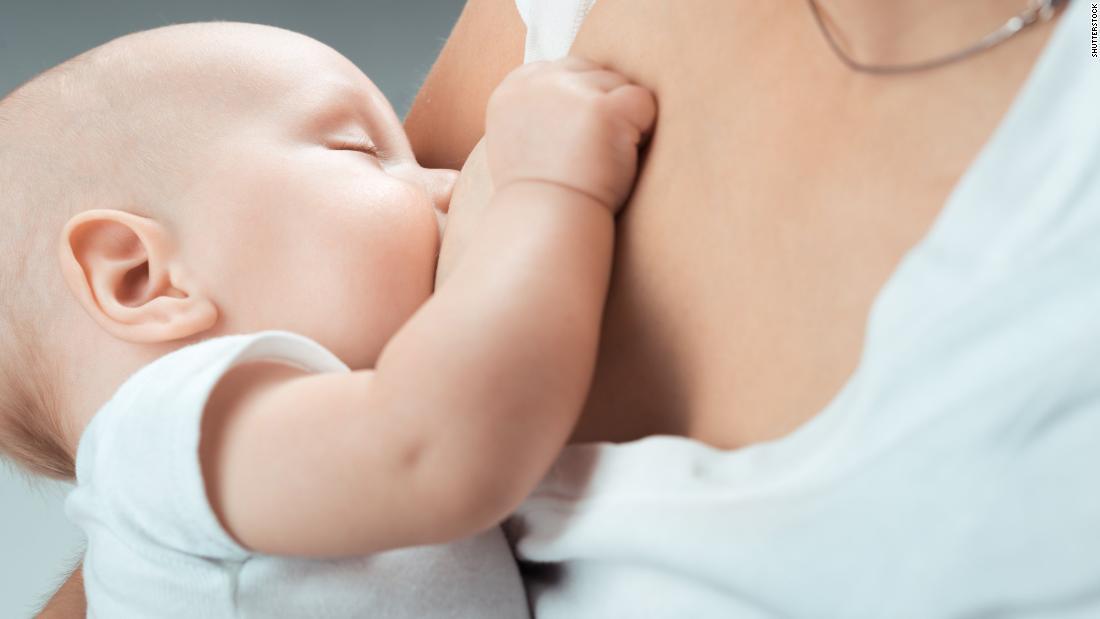Study: Breastfeeding Helps Protect Mothers From Cancer
(CNN) -
Infants who were breastfed for any length of time had lower blood pressure than those who were not breastfed at all, according to a new study, once again suggesting that "the breast is best" for health. .
The reduction in blood pressure found in the study "is of a clinically important and surprising magnitude," Dr. Lori Feldman-Winter told CNN in an email.
Feldman-Winter, who was not involved in the study, is the president of the Breastfeeding Section of the American Academy of Pediatrics.
"I could have expected the difference to be apparent just before or during adolescence, but the fact that these differences were observed as early as three years of age indicates that breastfeeding is involved in a metabolic programming that spans the entire life cycle." wrote Feldman-Winter, who is a professor of pediatrics at Rowan University's Cooper School of Medicine.
Any type of breastfeeding helps
The study, published Wednesday in the Journal of the American Heart Association, used data from nearly 2,400 children in the CHILD (Canadian Healthy Infant Longitudinal Development) cohort study.
CHILD is a longitudinal study that tracks the health of thousands of Canadian mothers and their children born between 2009 and 2012.
The study analyzed data on the duration of breastfeeding and compared it to her blood pressure at 3 years.
In general, breastfed children had lower blood pressure, regardless of how long they were breastfeeding.
advertising
The finding was unexpected, said study lead author Meghan Azad, deputy director of the CHILD Cohort Study, associate professor of pediatrics and children's health at the University of Manitoba in Winnipeg, Canada.
"We found, contrary to our expectations, that it didn't matter how long you were breastfeeding, whether it was two days, two weeks, two months or two years," Azad said.
"We saw an improvement in blood pressure profiles with any type of breastfeeding."
According to the U.S. Centers for Disease Control and Prevention (CDC), previous research shows that prolonged breastfeeding from six months to more than a year reduces babies' risk of suffering from obesity, diabetes and gastrointestinal infections, among others.
It also reduces the mother's risk of some types of cancer, diabetes, and hypertension.
Study: Breastfeeding Helps Protect Mothers From Cancer
A "dose response" is often seen, meaning "the longer the better" in relation to protection against infection and asthma, Azad said.
The official recommendation of the American Academy of Pediatrics is to exclusively breastfeed for the first six months, and then continue with complementary foods such as infant cereals, fruits, and vegetables for a year or more.
The World Health Organization recommends the same for the first six months, and continue breastfeeding and complementary foods until two years of age or older.
Breastfeeding immediately after birth is "crucial"
Previous studies that had examined the relationship between breastfeeding and children's blood pressure had been inconsistent, likely due to different definitions of breastfeeding, the study noted.
Researchers in the current study classified children based on the duration of breastfeeding in the first days of life.
One of these categories was "limited early breastfeeding", defined as that which only occurred in the hospital.
Unlike previous research on the topic, Azad said the study was unique because they had this very detailed information about breastfeeding during the hospital stay after delivery.
This information allowed them to conclude that even breastfeeding limited to one or three days in the hospital is associated with lower blood pressure at 3 years.
In these first few days of breastfeeding, mothers produce colostrum, which is known to be especially nutritious and strengthens the baby's immunity.
Prolonged breastfeeding increases the coefficient and income, according to study
"The first few days are really crucial," says Azad.
The reduction in blood pressure seen in breastfed children is significant compared to blood pressure levels in adults, which are associated with a lower risk of conditions such as hypertension and stroke, said the study's lead author. , Dr. Kozeta Miliku, a postdoctoral fellow at Hamilton McMaster University in Ontario, Canada and a clinical science officer for the CHILD Cohort Study.
"The findings that we see about breastfeeding and blood pressure could be clinically relevant," Miliku said.
"As an expectant mom, this research means a lot to me because it is important to understand that every drop counts."
While any amount helps, continue to support sustained breastfeeding, Miliku added.
Azad acknowledged different reasons why women don't breastfeed: they may not have been educated about its effects, they may feel embarrassed by social attitudes toward breastfeeding in public, and some may have clinical reasons for not breastfeeding, among other factors.
All of this must be recognized and addressed by policy makers and healthcare providers, he said.
In light of their findings, the study authors emphasized the need for immediate postpartum breastfeeding support and more breastfeeding education for new and future mothers.
Similarly, Feldman-Winter said the study advocates for policies that "work to improve maternity care practices that support the initiation of breastfeeding."
Azad and Miliku hope to continue to follow this cohort and monitor whether these differences in blood pressure levels at the age of 3 years impact the health of the participants in adulthood.
They also aim to learn more about colostrum and breast milk to understand why they are related to the reduction of negative health indicators.
4 Instagram accounts that will help mothers before and after pregnancy
Resources for breastfeeding
For new mothers who are breastfeeding, the American Academy of Pediatrics recommends knowing the signs of successful breastfeeding:
Make sure the baby's mouth is wide open, with the chin and nose resting on the chest.
The baby should put as much of the areola as possible into his mouth and rhythmically suck at small intervals.
If you can hear your baby swallow regularly and your nipple feels comfortable, you are breastfeeding properly.
Signs of improper breastfeeding are that the baby's head is not aligned with your body, that the baby sucks only on the nipple but not the areola, and that the baby's cheeks are pulled inward.
If you do not hear your baby swallow regularly or if you experience pain or damage to the nipple, you can seek advice from your pediatrician or a lactation consultant such as La Liga de la Leche, a non-profit organization dedicated to providing education and support to nursing mothers.
Breastfeeding Blood pressure






